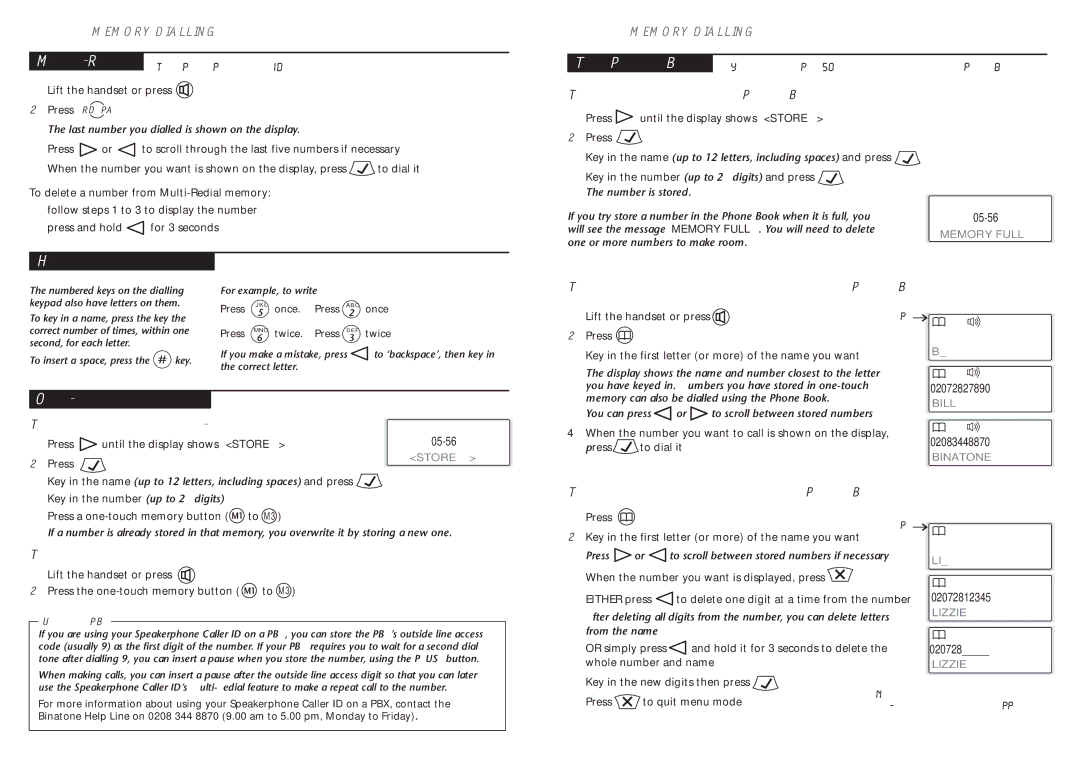
page 4 MEMORY DIALLING
page 5 MEMORY DIALLING
The Phone Book You can store up to 50 names and numbers in the Phone Book.
1Lift the handset or press ![]()
2Press RD•PA
The last number you dialled is shown on the display.
3Press ![]() or
or ![]() to scroll through the last five numbers if necessary
to scroll through the last five numbers if necessary
4When the number you want is shown on the display, press ![]() to dial it
to dial it
To delete a number from
press and hold ![]() for 3 seconds
for 3 seconds
To store a number in the Phone Book
1 Press | until the display shows <STORE > |
2Press ![]()
3Key in the name (up to 12 letters, including spaces) and press ![]()
4Key in the number (up to 20 digits) and press ![]() The number is stored.
The number is stored.
If you try store a number in the Phone Book when it is full, you will see the message: MEMORY FULL. You will need to delete
one or more numbers to make room.
MEMORY FULL
How to key in names
The numbered keys on the dialling keypad also have letters on them.
To key in a name, press the key the correct number of times, within one second, for each letter.
To insert a space, press the  key.
key.
For example, to write JANE:
Press | J K L | once. | Press | ABC | once |
5 | 2 | ||||
Press | MNO | twice. | Press | D E F | twice |
6 | 3 |
If you make a mistake, press ![]() to ‘backspace’, then key in the correct letter.
to ‘backspace’, then key in the correct letter.
To make a call to a number stored in the Phone Book
1 | Lift the handset or press |
|
| example |
|
|
|
|
|
| |||||||||
|
|
| |||||||
|
|
|
|
|
|
|
|
|
|
2 | Press |
|
|
|
|
|
| ||
|
|
|
|
|
| ||||
3 | Key in the first letter (or more) of the name you want |
|
| B_ | |||||
|
|
|
|
|
| ||||
| The display shows the name and number closest to the letter |
|
| ||||||
|
| ||||||||
|
| ||||||||
| you have keyed in. Numbers you have stored in | 02072827890 | |||||||
One-touch memories
memory can also be dialled using the Phone Book. | BILL | |||
You can press | or | to scroll between stored numbers | ||
| ||||
To store a number in one-touch memory
1 Press | until the display shows <STORE | > |
2Press ![]()
3Key in the name (up to 12 letters, including spaces) and press ![]()
4Key in the number (up to 20 digits)
5Press a ![]() to M3 )
to M3 )
<STORE >
4 When the number you want to call is shown on the display, |
|
|
| ||
02083448870 | |||||
press | to dial it | ||||
BINATONE | |||||
|
| ||||
To edit and delete numbers in the Phone Book
1 Press |
example |
If a number is already stored in that memory, you overwrite it by storing a new one.
To make a call to a stored number
1 Lift the handset or press |
2 | Key in the first letter (or more) of the name you want |
| ||
| Press | or | to scroll between stored numbers if necessary | LI_ |
|
|
|
| |
3 | When the number you want is displayed, press |
| ||
2 Press the | to M3 ) |
Use on a PBX
If you are using your Speakerphone Caller ID on a PBX, you can store the PBX’s outside line access code (usually 9) as the first digit of the number. If your PBX requires you to wait for a second dial tone after dialling 9, you can insert a pause when you store the number, using the PAUSE button.
When making calls, you can insert a pause after the outside line access digit so that you can later use the Speakerphone Caller ID’s
4 | EITHER press | to delete one digit at a time from the number |
| After deleting all digits from the number, you can delete letters | |
| from the name |
|
| OR simply press | and hold it for 3 seconds to delete the |
| whole number and name | |
5 | Key in the new digits then press | |
02072812345
LIZZIE
020728_____
LIZZIE
For more information about using your Speakerphone Caller ID on a PBX, contact the Binatone Help Line on 0208 344 8870 (9.00 am to 5.00 pm, Monday to Friday).
Note — numbers you have stored in
6 Press to quit menu modeone-touch memory will also appear, and can be edited and deleted this way.
